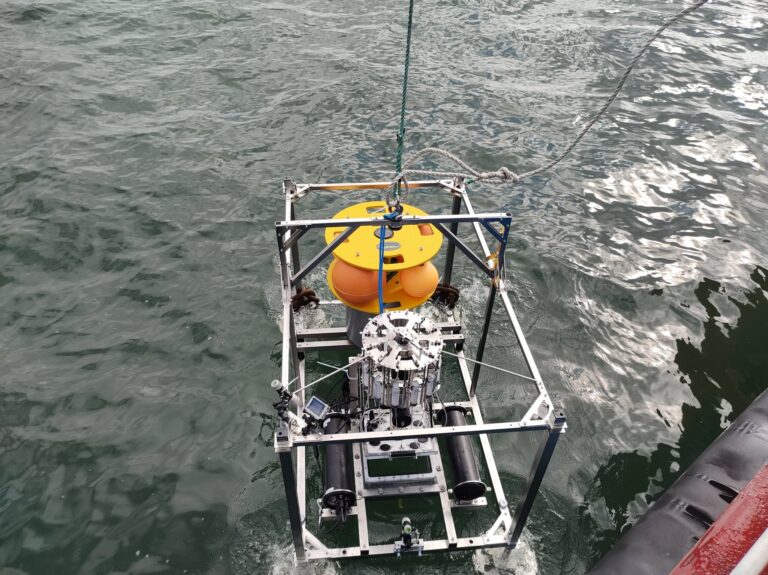Project Description
The Irish Sea is a semi-enclosed shelf sea on the European continental shelf, which connects through the North Channel to the Malin Sea and through St George’s Channel to the Celtic Seas. It supports regionally important fisheries for Norway lobster, scallops and whiting and, historically, supported a major Atlantic cod fishery. Many of these fisheries are centred on the western Irish Sea Gyre, a seasonal oceanographic feature that causes the formation of a thermocline and restricts hydrographic circulation. The gyre overlies a large area of fine sediments (the Irish Sea mud patch) which plays an important role in terms of seabed carbon sequestration and storage. However, the structure and functioning of the gyre is likely to change under future climate change and marine spatial use scenarios. Under a warming climate, the gyre may increase both in terms of area and duration with potential to restrict the availability of oxygen close to the seabed. In addition, large scale expansion of offshore renewable energy generation in the Irish Sea may have implications both in terms of gyre circulation and flux of organic matter to the seabed within this oceanographic feature.
Benthic communities, both faunal and microbial, fuel shelf sea primary productivity via rapid recycling of nutrients, are integral parts of food webs and include species targeted by important fisheries. Their structure and functioning also mediates the accumulation or loss of Blue Carbon and in turn are influenced by factors such as grain size distribution and temperature. For example, studies conducted on windfarms in the Belgian North Sea have identified the encrusting organisms on windfarms structures as drivers of a changes in the seabed, enhancing organic carbon deposition (in the form of faecal pellets), altering sediment and geochemistry (refs).
Changes in oxygen availability, bottom water temperature and the supply of organic matter in the Irish Sea, therefore, have the potential to alter ecosystem functioning in the Irish Sea mudpatch, with implications for both carbon sequestration and fisheries management.
Within the scope of this project the PhD candidate will investigate how changes in temperature, oxygen availability and enhanced supply of organic matter will influence the early diagenesis and preservation of organic matter within the Irish Sea mud patch, and as such the potential for both climate change and human activities to potentially alter the region’s potential for carbon sequestration. The researcher will work with a multi-disciplinary team of scientists including biogeochemists, microbial and benthic ecologists, physical and chemical oceanographers, and participate in regular seagoing research cruises aboard the AFBI research vessel RV Corystes. They will use state of the art techniques including the deployment of benthic chamber landers to quantify spatial and temporal changes in sediment community oxygen consumption, carbon and nutrient fluxes across the mud patch, and stable-isotope pulse change experiments to investigate how changes in oxygen availability, temperature, and organic matter supply affect the pathways for carbon transfer through the sediment food-web and its potential for storage sediment organic matter pool. Faunal and microbial community structure will be assessed (e.g. MALDI-TOF mass spectrometry) and the link between changes in nutrient fluxes and community composition investigated further through sequencing, microscopy and biochemical assays for nutrient cycling pathways.
CANDIDATE BACKGROUND
- BSc or MSc in a relevant discipline
- Ability and willingness to join 7-10 day long research cruises (incl. basic fitness to achieve requisite ENG 1 medical certificate)
Photo credit: Billy Hunter, AFBI
Supervisors
Ursula WittePrimary Supervisor: | Profile: Ursula Witte Email: u.witte@abdn.ac.uk Institution: University of Aberdeen Department/School: School of Biological Sciences |
Jason ChinSecondary Supervisor: | Profile: Jason Chin Email: j.chin@qub.ac.uk Institution: Queen's University, Belfast Department/School: School of Biological Sciences |
Additional Supervisor: | Dr. Philip Smith, University of Aberdeen, School of Biological Sciences Dr. William Ross Hunter, Senior Marine Chemist, AFBI |
References
Black KE, Smeaton C, Turrell WR and Austin WEN (2022) Assessing the potential vulnerability of sedimentary carbon stores to bottom trawling disturbance within the UK EEZ. Front. Mar. Sci. 9:892892. doi: 10.3389/fmars.2022.892892
Bianchi TS, et al. (2021) What global biogeochemical consequences will marine animal–sediment interactions have during climate change? Science of the Anthropocene 9(1): 00180 doi: 10.1525/elementa.2020.00180
Rodil et al. (2021) Variable contributions of seafloor communities to ecosystem metabolism across a gradient of habitat-forming species. Mar Env Res 167, 105321. https://doi.org/10.1016/j.marenvres.2021.105321
QUADRAT Themes
- biodiversity
- earth-systems
- environmental-management
Partners
CASE Partnership with Agri-Food and Biosciences Institute, Belfast
A CASE Partnership project is delivered in collaboration with an industry partner. The CASE partner organisation contributes finance, expertise, facilities and an internship.






















































